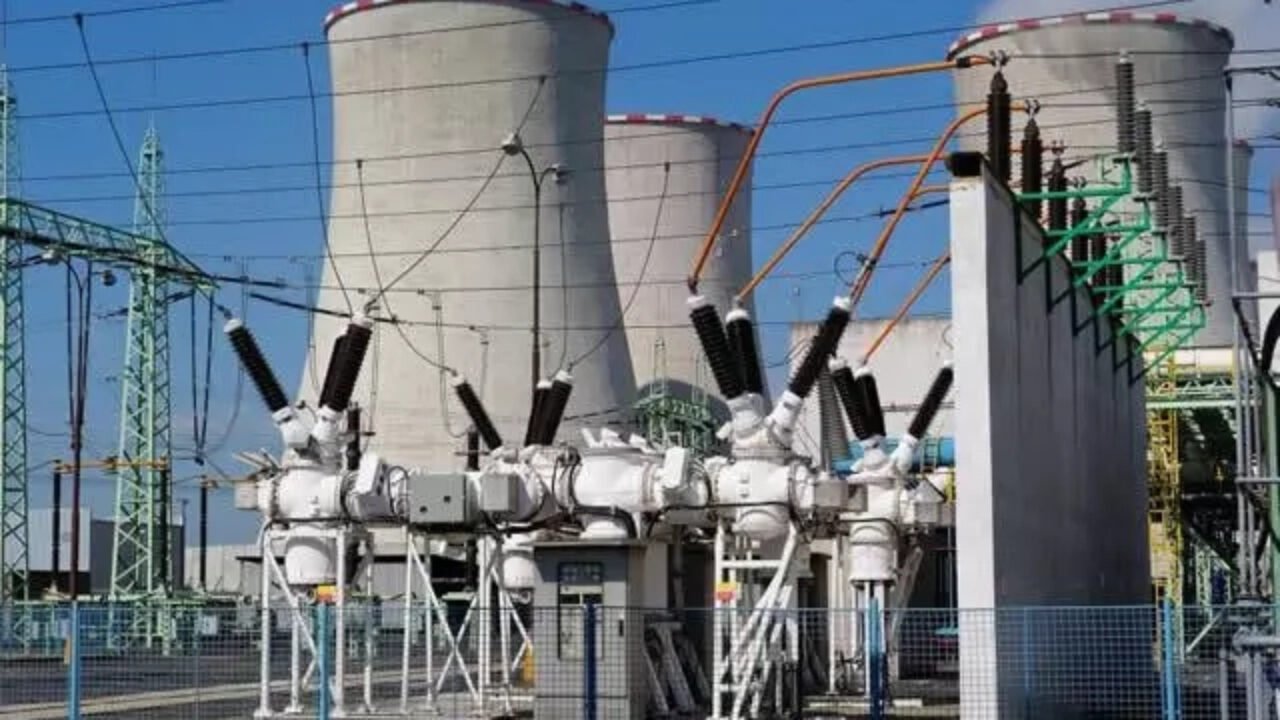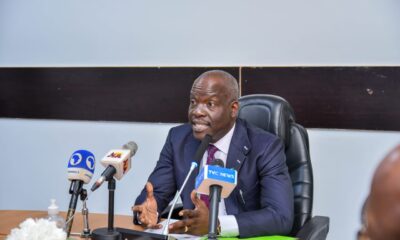Energy
FG begins 2022 mini-bid round – NUPRC
The Nigerian Upstream Petroleum Regulatory Commission (NUPRC) has begun the 2022 mini-bid round process in accordance with the Petroleum Industry Act (PIA), 2021.
The mini-bid round is an opportunity to spur new oil exploration and drilling activities in the prospective deep waters offshore Nigeria.
Commission Chief Executive (CCE), NUPRC, Mr Gbenga Komolafe made the announcement on behalf of the Federal Government in a statement on Tuesday in Abuja.
Komolafe said the mini-bid round was aimed at further development of the deep offshore acreages.
This, he said, would be held in accordance with the PIA with its enhanced legal and regulatory frameworks that sought to encourage new investors and investments into the next phase of exploration in this region.
“The mini-bid round will be managed by the NUPRC, in line with the provisions of the PIA, as the statutory body responsible for ensuring compliance with petroleum laws, regulations, and guidelines in the Nigerian upstream petroleum industry.
“The National Data Repository of NUPRC and our multi-client partners are delighted and ready to support the Mini Bid Round underpinned by high-quality datasets. The blocks have extensive 2D and 3D seismic data coverage, including multi-beam and analog data.
“Additionally, a remarkable quality, 3D MegaSurveyPlus reprocessed Pre-stack Time Migration (completed October 2022), with angle stacks and gathers is also available to prospective bidders.
“Links to all data can be accessed via the dedicated NUPRC portal.
“The mini-bid round is a market-driven programme and will follow a transparent and competitive procurement process designed to attract competent third-party investors globally that have the capability and proficiency in operating in deepwater environment,” he said.
He said the mini-bid round intends to build on the successes of the last bid round held in April 2007 during which a total of 45 blocks, drawn from the Inland Basins of Anambra, Benue and Chad; the Niger Delta Continental Shelf; Onshore Niger Delta and Deep Offshore were put on offer.
He recalled that the 2007 bid round was held under a different regulatory regime (the Petroleum Act, 1969) and generated massive interest and participation with its attended revenue which made the exercise a success.
In this 2022 mini-bid round, he said that seven offshore blocks covering an area of approximately 6,700 sq km in water depths of 1,150m to 3,100m were put on offer.
He said the success of the mini-bid round would ensure all stakeholders gain value from the country’s resources, whilst paying close attention to reduction in carbon emissions, as well as overall environmental, social and governance (ESG) considerations.
According to him, a dedicated programme portal (br.nuprc.gov.ng) for the mini-bid round has been published by the NUPRC.
He further said that a pre-bid conference has been scheduled for Jan. 16, 2023 at Eko Hotels and Suites, Lagos.
Komolafe said the conference would provide potential applicants with an opportunity to ask questions concerning the mini-bid round processes and requirements.
He said that interested companies would be invited to submit pre-qualification applications by Jan. 31, 2023.
Komolafe assured that the NUPRC would continue to provide further details and roadmap for this international competitive mini-bid round in due course.
“Interested applicants are by the publication invited to participate in the process,” he added.
Energy
NERC slashes Band ‘A’ electricity tariff to N206.80 /Kwh


The Nigerian Electricity Regulatory Commission (NERC) has approved a downward review of electricity tariff for Band ‘A’ customers from N225/kWh to N206.80/kwh.
Under the approved review, Band ‘A’ customers who were previously charged N225/Kwh are now to pay N206.80/kwh.
The band’s customers are those who enjoy a daily supply of a minimum of 20 hours.
The review of the tariff was announced in Abuja on Monday by a notice issued by the management of Abuja Electricity Distribution Company (AEDC).
The notice read, ’’ We are pleased to share with you the revised tariff for our Band ‘A’ feeders, which will decrease from N225/kwh to N206.80 effective May 6.
“We assure customers on our Band ‘A’ feeders of continued availability of electricity supply for 20-24 hours daily.
“Please note that the tariffs for Band B, C D and E remain unaffected. ‘’
Energy
Unbundling of TCN will improve access to electricity — Experts


Some power experts have commended the Federal Government’s decision to unbundle the Transmission Company of Nigeria (TCN), saying this will improve access to electricity.
They spoke in separate interviews with journalists on Sunday in Lagos.
Recall that the Nigerian Electricity Regulatory Commission (NERC), on May 3, unbundled the TCN into two separate entities, raising hopes for a more efficient and reliable national grid, potentially leading to increased access to electricity.
NERC, acting under the provisions of the Nigeria Electricity Act, ordered the establishment of an Independent System Operator (ISO) to take over the market and system operations functions of TCN.
According to the order, TCN will retain its transmission service provider licence and continue to maintain power transmission infrastructure across the country.
Chairman, Customer Consultative Forum of Festac/Satellite Town, Dr Akinrolabu Olukayode, described the unbundling as a welcome development to further improve the power sector.
According to Olukayode, the attempt is striving at ensuring a balanced system where the monopoly enjoyed over these few years by TCN is dissolved to allow for new hands who will inject fresh ideas, devoid of monotonous inclined perennial failure as witnessed in recent times.
“The effectiveness of power transmission will largely be determined by the quantum of synergy between power generating channels and structure for maintenance of the grid.
“The generating plants should be energised to full capacity scale,” he said.
The expert urged the government to set 60 percent capital funding to subsidise expenditure on procurement from the budgetary allocation and offer shares for public subscription to keep the sector lubricated.
He said that TCN was partially progressive but undue government influences created rooms for bureaucracy which made its operations ladened with hiccups.
Olukayode said that there was a need for the government to declare a state of emergency in power that will usher in fresh hands to rid the system of saboteurs.
Also, National Coordinator, All Electricity Consumers Protection Forum, Mr Samuel Ilori, described the unbundling of TCN as good and welcoming, while advising the government to do due diligence and avoid the replica of what happened in distribution companies.
Ilori said that the unbundling is expected to improve service delivery and effectiveness, adding that many of the equipment and substations in the sector are moribund and obsolete.
He said that injection of money and expertise to the area of transmission might help stem the tide of incessant collapse of grids and allow what was being generated to be distributed.
“My advice is to scrap the privatisation of the distribution companies in 2013 by President Jonathan administration.
“If proper foundation was laid then and things were done according to the laid down rules of the Bureau of Public Enterprise (BPE) then as headed by Mrs Bolanle Onagoruwa, we will not be having this mess.
“The Siemens contract as of today remains elusive as we do not know what is going on.
“Government needs to declare a state of emergency in the sector to be able to set it on a recovery path,” he added.
A power expert, Mr Toluwalase Godwin, said the new operator would manage electricity demand and supply, ensuring the delivery of electricity where and when needed, without bias, at the lowest cost possible, while ensuring reliability and avoiding grid instability and collapse in the process.
“This means that NISO will be responsible for dispatch management, international transmission, capacity management, and wholesale market in the near future.
“Potentially signalling the near end of life for Nigerian Bulk Electricity Trading Plc, which currently oversees some of NISO’s functions,” he said.
He noted that this development is moving to a more liberalised market where NISO would be increasingly responsible for capacity auction, real-time energy market, ancillary services procurement, day-ahead market, spot market, reserve management, pricing and settlement.
“The separation of responsibilities between entities allows for a concentrated focus, with transmission services management predominantly revolving around technological aspects, while system operations are entrenched in energy economics.”
Energy
FG pegs electricity supply to international customers at 6% of available grid generation


The Federal Government has mandated system operators in the Nigerian power industry to supply not more than six percent of total available grid generation per hour to international customers or off-takers.
In a new order by the Nigerian Electricity Regulatory Commission (NERC) to electricity generation companies on Saturday, the regulator stated that the priority system of prioritising international customers and limiting distribution companies (Discos)’ offtake during times of imbalances in the grid is both inefficient and inequitable.
According to the new order, the aggregate capacity to be allocated by electricity generation companies to international off-takers in the next six months shall not be more than 10 percent of Genco’s generation capacity.
It stated, “The System Operator shall ensure that the maximum load allocation to international off-takers in each trading hour shall not be more than six percent of the total available grid generation.
“The aggregate capacity that can be nominated by a generating plant to service international off-takers shall not be more than 10 percent of its available generation capacity unless in exceptional circumstances a derogation is granted by the Commission.”
Furthermore, the new order mandated the system operators and the Transmission Company of Nigeria (TCN) to install IoT meters at all offtake and delivery points of Eligible Customers, bilateral supplies, cross-border trades, and outgoing 33kv feeders of the DisCos to provide real-time data on supply to offtakers.
The new order also mandates the system operator to publish hourly readings of adherence to grid instructions to check for violations of offtake contracts and also publish the previous day’s hourly log reading to market participants.
The Federal Government has observed that electricity generation companies in times of low grid availability prefer to supply to international customers sometimes above the allocated offtake on the bilateral contracts.
The NERC noted that such practices have caused untold hardship to Nigerians due to irregular supply to Discos, especially during times of high demand, hence this order.
By the order, the Federal Government is prioritising electricity supply to local customers- industrial and residential- following the hike in electricity tariff to Band A customers and the need to ensure the set hours of electricity supply to different categories of local customers is met.
-
capital market2 years ago
Rt.briscoe, FBNH, Others halts negative performance of stock market
-
Finance3 months ago
Court orders Sen. Victor Umeh to repay N136m bank debt to AMCON
-



 Abuja Update2 months ago
Abuja Update2 months agoUNDP, FG partnership needed to achieve inclusion, equity- Minister
-
Abuja Update1 month ago
Banks drive stock market performance with N147bn gain
-



 Business2 weeks ago
Business2 weeks agoTingo Group unveils Tingo Electric, Tingo Cola drink at Lagos launch
-



 Health3 weeks ago
Health3 weeks agoCapacity training will reduce migration of health workers- NPHCDA
-
News4 months ago
Oil thieves sponsoring malicious media campaign against Navy – Spokesman
-



 Infotech1 month ago
Infotech1 month agoWorld Backup Day: NITDA urges Nigerians to ensure backup of data














